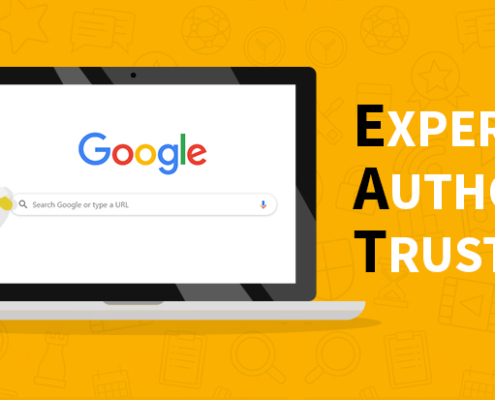WHAT IS SEARCH INTENT IN SEO?
Table of Contents
Search intent has been an important topic in SEO for the past few years. For obvious reasons, content that doesn’t match search intent simply won’t rank. Over the years, it has become increasingly accurate for Google to target people’s search intent. The entire Google search results page is now trying to best match search intent with website’s content rather than keywords.
As Google gets better at providing people with the exact search results they want, creating content that matches search intent becomes an SEO necessity.
What is Search Intent and Why does it Matter?
Search intent (also known as user intent or audience intent) describes the underlying purpose or intent of a particular search query. It is the reason why a user is searching for something online. Why do they want to search? What are they trying to achieve by searching? Are they trying to find out the answer to a question, or are they visiting a specific website?
As an example, usually people search for keywords or phrases that show their intent. For example, instead of just searching for “SEO”, people type in: SEO North Sydney, SEO Chatswood, or Website design restaurant. From these keywords, we can determine that the user’s intent is to find companies that offer local SEO services or Website design services. In this case, we assume the user or searcher has a commercial / buying intent as he or she is looking for a service.
On the same note, if the user is searching “what is SEO” or “what is SEO service”, it shows a lower buying intent, and more of a research intent, AKA Informational intent. Google will definitely match different content in the search results with the search intent.
The depth of your understanding of user intent will affect your website’s ability to rank well for its target keywords. Ultimately, it affects whether users are satisfied with your content and whether your content best meets what they are looking for. Focusing your SEO strategy on the search intent is the key to improving your SEO rankings.
Once you have considered the search intent of your potential users, you can create content to meet their needs and desires. Optimising your website for search intent can increase page views and increase sales on your e-commerce site.
Four Different Types of Search Intent in SEO
1. Informational intent
Information searches are the most common type of search carried out by users. The basis of these search queries is to learn about a subject or topic. This can be simple and specific (“How to make a web page?”) or a complex and broad query (“What are the tools available to create web pages?”). Search queries such as these have the highest search volume because there are just so many people searching for general high level information.
These searches occur in the discovery phase of the search or a buying cycle. People are looking for content-rich pages that provide answers to their questions.
These pages should be easy to navigate so that users can quickly access important information.
If Google thinks a search query has a quick and specific answer (for example, WordPress is a tool for making web pages), it may use featured snippets and other SERP features, so users don’t have to click on any website to get the answer they want.
Typically, these searchers will usually exit the SERPs once they get their answers, and while you may consider this type of site visitor to be useless as they may not make a purchase or complete any conversions on your site, they are still worth targeting.
Being able to answer searches for informational intent is a great way to increase your site’s relevance and prove to the Google algorithm that your site has E-A-T (expertise, authority and trustworthiness), which will significantly improve your rankings.
2. Navigational Intent
Navigational intent refers to the searcher’s intent to include all search queries for which they wish to find a website, business or physical location through a search engine and attempt to navigate to their website. They may enter “Apple iphone” or “jb hifi” in the search bar because users sometimes find it easier to search for a company directly than to enter a URL, or they may not know the URL of the company.
When you look at the search results for a navigational search, the search engine results page (serp) focuses on the home page and product pages of a particular website.
Local and visit searches usually fall into this category because their purpose is to get users to go somewhere, whether it’s a website or a physical shop. When searchers search with navigational intent, they have a clear product or location in mind. This means that you don’t need to put much effort into trying to sell new products when targeting navigational user intent.
For this type of search phrase, make sure that the local merchant information on your website is correct and up to date. Also, make sure that the shop’s location and contact information is easily accessible on the site.
3. Transactional Intent
Transactional intent searches can be very valuable for SEO strategies. This is because when a searcher is interested in buying something, they have transactional intent. Often, this person has already decided to buy, and a click will most likely lead to a purchase. Common examples of this type of user intent include ‘book hotel for the weekend’ or “buy bicycle online’.
Most transactional search queries are straightforward and obvious, making them a great way to lead and convert. If the user’s intent is confusing (it can be transactional, informational, or commercial) then Google SERPs may include several features (knowledge panels, local packages, or people also asking).
Doing so allows users to get more information about the product or complete a purchase, depending on which result matches their actual intent.
Transactional keywords are money makers for a website. We can increase conversion rates by targeting transactional keywords with an optimised product landing page and a simple buying process.
4. Commercial intent
Commercial search intent overlaps with informational intent in that it seeks information about a topic. The only difference is that it is more product or brand focused and usually occurs before the customer makes a purchase decision.
Searchers with commercial intent are looking for a specific product or service but have not fully researched their options. They may also be researching different brands or options. A searcher with commercial intent might search for “best laptops” or ” MacBooks vs Surface Pro”.
These are the keywords that your readers use when researching your product. Therefore, you should nail down the commercial intent to drive your audience’s buying journey and capitalize on their interest in your product/service.
Benefits of Using Search Intent in SEO
Optimising pages to meet user intent will reap the benefits of search intent for your business. These benefits include better conversion rates, improved engagement, and increased organic traffic, including other SEO improvements.







